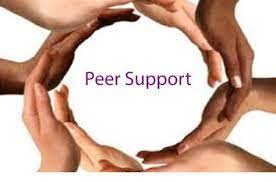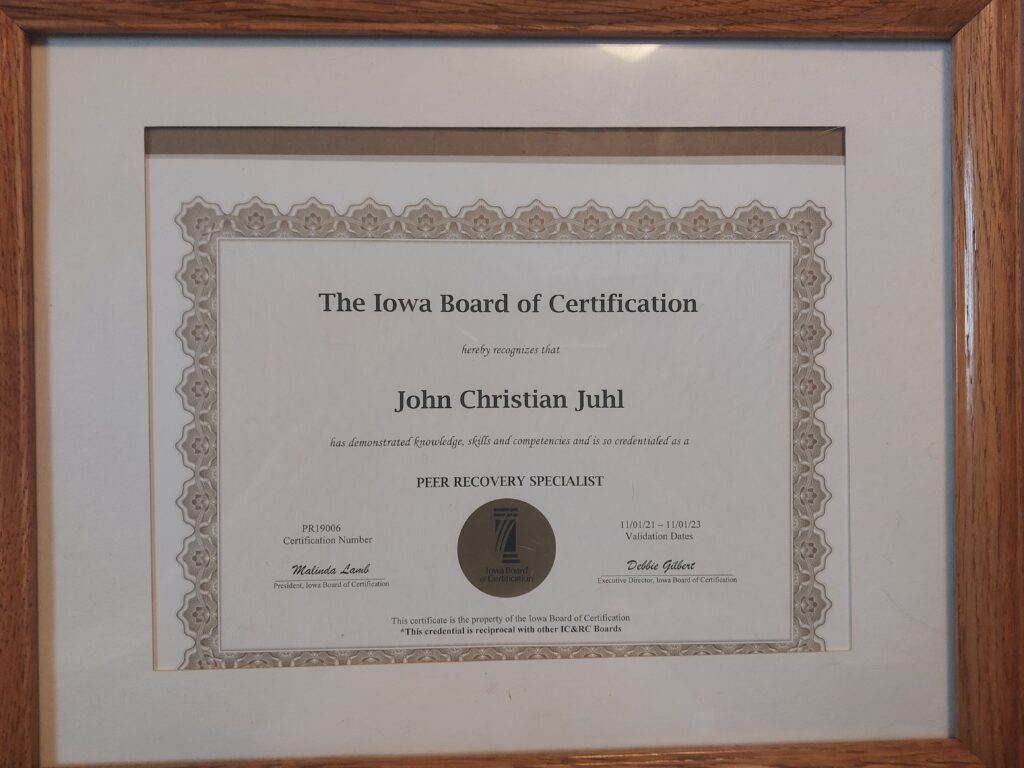
Good question what are the 3 key things to know about peer support? Peer support is the support given by a person with the life experience of recovery from a mental or addiction problem or conflict. The peer uses their experience of recovery to help another individual with similar problems or Conflicts. To help them reach recovery
Example: I am a person who has recovered from mental problems but has never been fully diagnosed. I have had incidents of mental breakdowns, anxiety, and panic attacks and at one point I had verbal hallucinations because of the side effects of neurology medicine I took for epilepsy.
Because I am a person who has recovered from those problems, I become a peer supports to help others with similar problems. All states have peer support and training for peer support. It is in the regulations of Medicaid. States train and support peer support in their own way. In my state of Iowa, the University of Iowa was the source of training to become a peer support specialist when I started. Training sources change as time goes.
1. Peer Support
My class was around 16 people, requirements to become a peer support specialist as I mentioned before, was to be a person who had recovered from a mental or addiction problem. You used your experience from recovery to help other people with similar problems to reach their recovery.
As a new student and not knowing much about Peer support, the idea of someone with similar problems but helping after recovery amazed me. This resource of help could be extremely helpful to myself and to others.
With that said I have found that peer support is 1 of a kind. I learned that helping others in recovery can help you stay in recovery. Where I am from, not too many people know the meaning of peer support. Most people in the small communities in Iowa don’t even realize that peer support is a service anyone can use.
Needing peer support can be because of having anxiety thanks to local or national news, work stress causing depression, being in extra-large groups causing panic attacks. Pointing out not all mental problems are related to hallucinations, disorders such as schizophrenia, or Dissociative identity disorder (Multiple Personality Disorder).
The Wellness Center where I worked is open to anyone. We helped individuals with getting services, one on one’s if individuals needed someone to listen, and support groups. Some of the support groups that we ran at the Wellness Center were anger management, daily planning, eating healthy, Self-negative talk, and my favorite W.R.A.P. which stands for wellness recovery action plan. WRAP is about finding resources to prevent you from reaching a crisis or planning in response to you reaching a crisis.
As a young man, I could have used resources such as these to help me in my recovery, but I didn’t know anything about it at that point in time. In my mind now that I know of such resources, I felt I needed to help make it so other people in my local community could know about and use resources like that,
After graduation from my Peer Support Training class in May. The class takes 40 hours of training. For me, it was 1 week, and during covid, it was 2 weeks 20 hours per week online, and it now has returned to 40 hours in one week. After the class, you take a simple test to qualify as trained peer support in Iowa.
After training, I took the Peer Recovery Specialist state certification test in November. It takes an extra 6 hours of ethics training and 500 hours of experience as a Peer Support, which can be earned if you work at a service or clinic as peer support before taking the peer support training class, to be eligible in Iowa to take the state certification test. The requirements to take the class to become a Peer Support Specialist and a State certified Peer Recovery Specialist are different in every state.
2. Training
My class was around 16 people, requirements to become a peer support specialist as I mentioned before, was to be a person who had recovered from a mental or addiction problem. You used your experience from recovery to help other people with similar problems to reach their recovery.
As a new student and not knowing much about Peer support, the idea of someone with similar problems but helping after recovery amazed me. This resource of help could be extremely helpful to myself and to others.
After graduation from my Peer Support Training class in May. The class takes 40 hours of training. For me, it was 1 week, and during covid, it was 2 weeks 20 hours per week online, and it now has returned to 40 hours in one week. After the class, you take a simple test to qualify as trained peer support in Iowa.
I took the Peer Recovery Specialist state certification test in November. It takes an extra 6 hours of ethics training and 500 hours of experience as a Peer Support, which can be earned if you work at a service or clinic as peer support before taking the peer support training class, to be eligible in Iowa to take the state certification test. The requirements to take the class to become a Peer Support Specialist and a State certified Peer Recovery Specialist are different in every state.

3. Services & Resources
In the state of Iowa, it is still on the lower end of sources of help, according to the state, but other states such as Pennsylvania and Virginia supplying the best peer support services in the united states, To them it is a core service.
Iowa is the first to have a rural peer respite house, called Rhonda’s House. Which is run by Life Connections Peer Recovery Services, website is www.lifeconnectionsrecovery.org. Most states that have services like Rhonda’s House are only available in large communities and cities, but not in small rural communities.
It is also pointed out on the Mental Health America website; peer support is available in all 50 states but is only reimbursable in 35. The type and number of services go state by state. Most of all peer support services are free to the individuals but bill Medicaid and insurance. In the state of Iowa, if the service is not able to bill Medicaid, they bill the Mental Health and Disability Services region.
Iowa is broken up into 14 regions. I worked in the Eastern Iowa Mental Health and Disability Services region. It is made up of 5 counties: Clinton, Scott, Muscatine, Cedar, and Jackson county. The region I worked in; website is www.easterniowamhds.org
Other local, state, and National resources are located on these websites
Conclusion
I have now helped plenty of people with situations, mental conditions, and addiction problems to get on the path to recovery. It is rewarding to know that I have helped someone else, recover and stay on the path of recovery. I learned recovery is a lifelong path with twists and turns, ups and downs but in the end, recovery is always possible.
Asking for help to achieve the goal of recovery is never a weakness it is always a strength.
